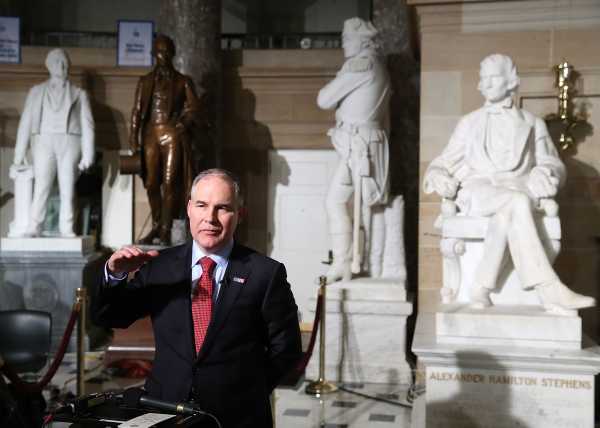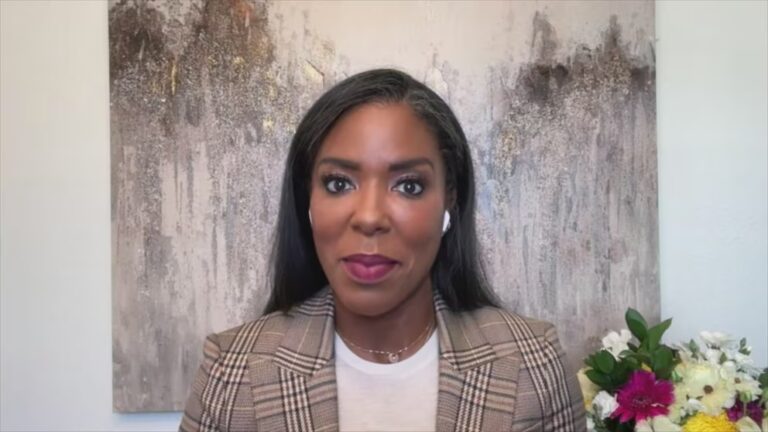
At a barely publicized event Tuesday with no reporters present, Environmental Protection Agency Administrator Scott Pruitt signed a new directive aimed at increasing transparency in science.
The announcement poses a fundamental challenge to the agency’s work as a regulator by instituting new restrictions on the scientific findings used by the EPA.
“It’s reducing the pool of science the agency can use,” said Christopher Zarba, who retired earlier this year from the EPA as the coordinator of the agency’s science advisory boards.
The move comes as Pruitt faces an avalanche of questions about alleged ethics violations — involving his 24-hour security detail, his $43,000 phone booth, and his luxury travel — as well as open calls from some Republicans to resign and reports that Trump will fire him “soon.” On Thursday, he will go before the House Energy & Commerce Committee as well as the House Appropriations Committee, ostensibly to talk about the EPA’s budget for the upcoming fiscal year.
But even as Pruitt fights for his job, with the new directive he is dramatically changing the role of research at the EPA and may in turn bring about outcomes that favor the very industries the agency is supposed to regulate.
Pruitt says he wants to eliminate “secret science”
Pruitt has steadily eroded environmental regulations from all sides. He is already rolling back rules on limiting air pollution. He is halting implementation of greenhouse gas restrictions. He is weakening enforcement against polluters. And he is stalling for time on many other responsibilities.
At the same time, he has also taken unprecedented steps to oust the agency’s science advisers and replace them with researchers from industry and from states that have previously sued to block environmental regulations.
In the new directive, Pruitt wants regulations modeled on the HONEST Act, a bill championed by outgoing House Science Committee Chair Rep. Lamar Smith (R-TX) to eliminate “secret science.” (Smith is one of the few Republicans reaffirming support for Pruitt as others have distanced themselves, praising Pruitt as “courageous” at the announcement.)
The idea is to exclude studies that aren’t reproducible or don’t make their underlying data public, standards that would bar research based on one-off events like toxic chemical leaks or experiments involving confidential patient data.
“The ability to test, authenticate, and reproduce scientific findings is vital for the integrity of [the] rulemaking process,” Pruitt said in a statement. “Americans deserve to assess the legitimacy of the science underpinning EPA decisions that may impact their lives.”
However, documents released to various news organizations under Freedom of Information Act requests also show that Smith’s office coordinated with the EPA to carve out exemptions to allow industry-backed research to still be considered by the agency.
Which means industry-friendly science could weaken the case for developing new rules and undermine the rationale for existing regulations. For instance, stricter limits on pollutants like ozone may not go into effect and the EPA may not have the foundations to tackle emerging environmental health threats like the harm from newly introduced chemicals.
Science is the foundation of the EPA’s work, and it’s being eroded
As an agency that protects public health, the EPA draws on a wide body of research to inform regulations like how much lead is safe in drinking water (less than 15 parts per billion, in case you were wondering).
Congress has mandated that the agency use the best available science when it comes up with limits for hazardous chemicals or evaluates the effectiveness of its own regulations.
The Clean Air Act, for example, directs the EPA to “conduct, and promote the coordination and acceleration of, research, investigations, experiments, demonstrations, surveys, and studies relating to the causes, effects (including health and welfare effects), extent, prevention, and control of air pollution.”
Related
“Climate change” and “global warming” are disappearing from government websites
This is a constant, ongoing process, with new scientific findings trickling in and new gaps in knowledge being uncovered. That’s why the EPA maintains a stable of science advisers who are up to date on the latest research to help evaluate scientific findings on their merits.
Most of these scientists come from universities and fund their academic research with grants from the EPA. But in his first big attempt to shape the science, Pruitt said last October that getting an EPA grant and advising the agency is a conflict of interest, and removed scientists from advisory boards who were getting EPA money for their work.
Yet many of their replacements have come from state environmental agencies that also get funding from the EPA, which, according to Pruitt, isn’t an unbearable conflict of interest. Nor is it a conflict of interest to advise the EPA if you work for a state agency that is suing the agency to block its rules. It’s also not a conflict if you’re a science adviser also working for a chemical manufacturer or an oil company, industries the EPA regulates.
Betsy Southerland, who led EPA’s Office of Science and Technology in the water division before resigning in protest in July, told Vox that the EPA historically did give industry scientists a seat at the table, provided they passed the same ethics reviews that academic scientists faced and they recused themselves from issues that would affect their employers or industries.
Some of the new additions, however, have long campaigned against environmental regulations and are coming to the advisory board with an agenda. The new chair of the Science Advisory Board, Michael Honeycutt, spent much of his career arguing against the EPA’s ozone restrictions.
“Now they’re adding people who were very vocal and articulated in public opposition to environmental rules,” Southerland said. “It will be difficult to separate out. That is my great fear.”
More than 900 scientists signed a letter to the EPA this week opposing the new standards.
Pruitt’s latest move sets a restrictive standard for public health research
When Vox asked EPA for an example of where this new regulation would be effective, a spokesperson cited the request it received in 2007 to remove tolerance limits for the pesticide chlorpyrifos, potentially leading to a ban.
The proposal was based on a study from the Columbia Center for Children’s Environmental Health. Since the study was so important to making the case for banning the pesticide, the EPA asked CCCEH for its raw data in 2010 to vet its findings.
In response, Linda Fried, senior vice president of the Columbia University medical center, wrote in a letter to the EPA that “we believe we cannot submit this extensive individual level data to EPA in a way that ensures the confidentiality of the children and mothers who are our research subjects.”
Earlier this year, the EPA agreed to examine a “de-identified dataset.” The discussions are still ongoing, but in 2017 the EPA denied the petition to revoke tolerances for chlorpyrifos.
If the raw data were made available at the outset, perhaps the agency could have avoided years of tedious deliberation and come to a conclusion sooner. But opponents see cases like this as an example of how the new rules create a back door to limiting the EPA’s work as a regulator.
According to Southerland, much of the raw data from older foundational research is simply not available anymore (and some of the people involved are dead). In addition to confidential patient information, many industry-led environmental health studies have proprietary details about companies. That would take a large body of work out of consideration for rulemaking.
Indeed, deliberations among EPA political appointees showed that the agency was concerned about revealing industry trade secrets under the directive.
And the raw data that would be posted could be easily cherry-picked or misread, clouding the policy discussion, Southerland noted. As for reproducibility, many key environmental findings stem from one-off events, like the 2010 Deepwater Horizon oil spill, so those results can’t be repeated.
Putting these rules into effect would therefore cull the number of scientific studies available to the EPA, and it would cost $250 million a year to implement, according to a Congressional Budget Office analysis.
Environmental advocates and groups like the Union of Concerned Scientists are readying legal challenges should the rules go into effect, but Pruitt said he intends for the directive to be durable even as his position at the agency seems to crumble.
Sourse: vox.com






